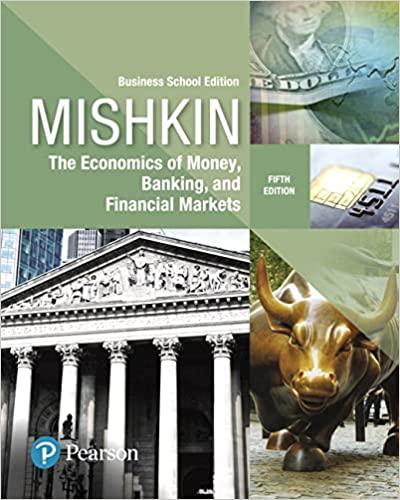Question
True or False .Alex Osterwalders business model canvass covers four main areas of any business venture: customers, offering, infrastructure, and financial viability. 2. Osterwalders business
True or False
.Alex Osterwalders business model canvass covers four main areas of any business venture: customers, offering, infrastructure, and financial viability.
2. Osterwalders business model canvass can be further divided into nine building blocks.
-
One of the building blocks referenced in #2 is key resources. Key resources include physical and financial, but do not include intellectual and/or human.
-
Another building block is key partnerships such partnerships (by definition) NEVER include strategic alliances with/between competitors.
-
An economy of scope refers to cost advantages that companies reap when their production becomes efficient. Companies can achieve economies of scope by increasing production and lowering costs. This occurs because costs are spread over a larger number of goods.
-
An economy of scale means that the production of one good reduces the cost of producing another related good. Economies of scale occur when the production of a wider variety of goods/services together (in tandem) is more cost efficient for a company than production of good/service independently. In this scenario, the long-run average cost to the company decreases because of the production of complementary good/services.
-
A company creates value/benefits customers/clients by solving a problem/satisfying a need. Customers /clients may choose to buy one product/service over another based on the following: newness, performance, customization, design, brand, price, cost reduction, risk reduction, convenience, and accessibility.
-
Channels refer to the various ways a company can bring/present their value propositions to customers/clients/potential customers or clients.
-
According to industrial psychologists, entrepreneurs, typically, share important personality traits. Specifically, most entrepreneurs are:
-
ambitious: competitive, with a high need for achievement;
-
independent: individualistic and self-starting, they prefer to lead not follow;
-
self-confident: decisive and optimistic in their ability to both (a) understand the challenges of starting and operating a business and (b) solve the business problems that will invariably arise;
-
risk-taking: willing to accept a moderate (and sometimes large) degree of risk in exchange for potential returns/benefits;
-
visionary: they can spot and act on trends;
-
creative: they can devise creative solutions;
-
energetic: they have high -energy levels (for instance, they often work a full-time job while starting a business);
-
persistent: they are determined /resolute (they have sufficient mental/emotional strength to continue with their course of action despite setbacks or opposition);
-
introverted: they focus on their inner thoughts/ideas (not what is occurring externally) and enjoy spending time with just one/two other people not large groups;
-
passionate: they love their ideas/services/products and are happy (frequently, proud) to bring them to the market
-
committed (they are willing to personally sacrifice to reach their goals)
-
A potential entrepreneur is a person who believes that he/she has the capacity (knowledge/ability) to successfully (a)start and (b) maintain a business.
-
Crowdfunding refers to obtaining start- up $$ (venture financing) from experienced investors (individuals/groups).
-
Social entrepreneurship refers to creating a venture to suit a personal lifestyle and not solely to make profits.
-
Serial entrepreneur and habitual entrepreneur are synonymous.
-
Equity capital refers to borrowed money that the debtor (such as an entrepreneur who needs start-up $$) must repay NLT some agreed-upon date.
-
Angel investing refers to creating/attempting to create a new company from (a) personal finances (the entrepreneurs own $$) or (b) the new companys operating revenue.
-
A family entrepreneurship is a business that multiple members of the same family own and operate.
-
corporate entrepreneurship refers to the creation of new products, processes, and ventures within large organizations.
-
Our text defines an established business owner as a person who is still active in a business that is more than 3.5 years old.
-
Our text defines a new business owner as a person who is actively involved in a business for more than three months but less than 3.5 years.
-
Our text defines a nascent entrepreneur as a person who created a business that he/she owns/co-owns that is less than three months old and has not yet generated wages/salaries for the owners.
-
The disadvantages of being a second mover include the following: Much higher research, development, and marketing costs.
Step by Step Solution
There are 3 Steps involved in it
Step: 1

Get Instant Access to Expert-Tailored Solutions
See step-by-step solutions with expert insights and AI powered tools for academic success
Step: 2

Step: 3

Ace Your Homework with AI
Get the answers you need in no time with our AI-driven, step-by-step assistance
Get Started


